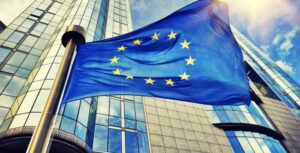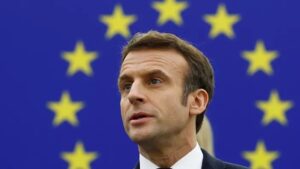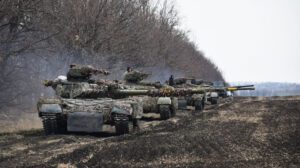
The Verkhovna Rada has improved the procedure for preparing bills on adapting Ukrainian legislation to the provisions of European Union law (EU acquis).
Draft resolution No. 7595 was supported by 297 MPs at the plenary session on Friday, parliamentarian Yaroslav Zhelezniak (the Holos parliamentary faction) said on his Telegram channel.
The resolution provides for the consideration of bills aimed at adapting the legislation of Ukraine to the provisions of the law of the European Union, the fulfillment of Ukraine’s international legal obligations in the field of European integration, the availability of tables of correspondence to them, as well as official translations of relevant acts of EU legislation and / or other sources of EU law.
According to the resolution, subcommittees will be created in the committees of the Verkhovna Rada to adapt the legislation of Ukraine to the provisions of EU law, the implementation of Ukraine’s international legal obligations in the field of European integration.
The resolution also provides for an additional examination of the compliance of European integration bills with Ukraine’s international legal obligations in the field of European integration and EU law in the Parliamentary Committee on European Integration and / or in the Cabinet of Ministers.
adapt, BILLS, EU stantards, LEGISLATION, UKRAINIAN PARLIAMENT

The Verkhovna Rada intends to equalize the terms of remuneration for citizens of Ukraine and foreigners.
The corresponding bill No. 5795 on amendments to the laws on the use of labor of foreigners and stateless persons in Ukraine was supported by 240 people’s deputies in the first reading at the plenary session of the Verkhovna Rada on Friday, the website of the parliament reports.
The bill proposes to amend the laws on employment and the legal status of foreigners and stateless persons.
The document provides for the improvement of the procedure for issuing (refusal to issue) or continuation (refusal to continue) the validity of a permit for the use of labor of foreigners and stateless persons.
As noted in the explanatory note to the document, the amendments to the laws will create equal conditions for remuneration for both Ukrainian citizens and foreigners and stateless persons who are legally in Ukraine.
The adoption of the draft law will provide legal grounds for the use of the labor of foreigners and stateless persons who study in educational institutions of Ukraine.
The document also provides for the free issuance of a duplicate work permit for foreigners and stateless persons in cases of loss or damage to a previously issued permit, the validity of which has not yet expired.
CITIZENS, CONDITIONS, FOREIGNERS, UKRAINIAN PARLIAMENT, WAGE

In Ukraine, from the beginning of 2023, newborns and 14-year-olds will be issued free certificates for Ukrainian publications in the amount of 0.3 subsistence minimum (lm) for able-bodied people (by the end of the year, this minimum will be increased from UAH 2,481 to 2684 UAH).
The relevant law “On Amendments to Certain Laws on Stimulating the Development of Ukrainian Book Publishing and Book Distribution” (No. 6287) was adopted by the Verkhovna Rada on Sunday with 314 votes without discussion, according to information on its website.
In addition, the document provides for the payment of subsidies to specialized stores from April 1, 2023, in which 80% of revenue comes from book products.
After the adoption on January 25 in the first reading, when preparing the bill for the second, the amount of rental compensation was slightly increased: in Kyiv and international airports – from 0.3 to 0.35 linear meters, in territorial communities from 500 thousand – from 0.2 up to 0.25 l.m., from 100 to 500 thousand – from 0.16 to 0.2 l.m., from 30 to 100 thousand – from 0.08 to 0.12 l.m. and up to 30 thousand inhabitants – from 0.04 to 0.08 l.m.
At the same time, the rental area, the fee for which is subject to compensation, is limited from 50 m in small communities to 150 m in Kyiv.
The amount of the subsidy may also not be more than 20% of the income received from the sale of books in the relevant bookstore.
In the financial and economic justification section of the explanatory note for the first reading, it was noted that the amount of expenses from the state budget for providing subsidies to bookstores in 2023 will be from UAH 52 to 86 million.

Verkhovna Rada Speaker Ruslan Stefanchuk will speak at the European Parliament and possibly meet with French President Emanuel Macron.
“First of all, in France, I will work on the parliamentary line…. A possible meeting with President Macron is being worked out, if the schedule allows,” Stefanchuk said on the air of the national telethon on Sunday.
According to Stefanchuk, in addition to Paris, he will visit Strasbourg and speak at the European Parliament.
“We will also work in Strasbourg, in the European Parliament. I will have a meeting with the leadership of the European Parliament and a speech in the European Parliament, and meetings with the main political groups of the European Parliament in order to enlist their support at this final stage,” Stefanchuk said.
He also did not rule out meetings with heads of other institutions of the European Union.
EUROPEAN PARLIAMENT, FRANCE, PRESIDENT, UKRAINIAN PARLIAMENT

Chairman of the Verkhovna Rada Ruslan Stefanchuk invited German Chancellor Olaf Scholz to visit Ukraine and speak in the Ukrainian parliament, the press service of the Verkhovna Rada office reports.
“Scholz thanked for this invitation, and I really hope that he will accept it,” Stefanchuk said in an interview with the ARD television channel, commenting on the results of the meeting with Scholz.
“Germany is the leader of the EU, and Germany’s opinion on Ukraine’s EU candidacy is very important. I think that I was able to dispel all the skeptical fears of Olaf Scholz and I really hope for his positive decision at the European Council summit,” the speaker of the Verkhovna Rada added.

Ukraine’s spending on the development and procurement of weapons and military hardware in 2022 has been increased by UAH 67.57 billion with UK loans totaling 1.7 billion and aimed at bolstering capacities of the Ukrainian Navy.
The Ukrainian Verkhovna Rada adopted the respective bill by 342 votes on Tuesday.
The bill enlarges this year’s budget expenditures from UAH 1,525.930 trillion to UAH 1,593.5 trillion with the special fund’s growth to UAH 221.11 billion.
Meanwhile, the budget deficit ceiling was raised from UAH 188.8 billion to UAH 256.36 billion, including UAH 96.1 billion for the special fund.
In addition, the budget no longer has restrictions at the amount of 3% of the planned revenue for the provision of state guarantees, as well as restrictions at the amount of UAH 10 billion and UAH 20 billion, respectively, for the provision of portfolio guarantees and loan guarantees, in order to increase the national defense capacity.
The bill limits road fund expenditures. “The money will be primarily spent on repaying the state debt, defense, and the development and maintenance of roads,” the Servant of the People faction said in comment on the bill.
An explanatory note says that Ukraine will be implementing state investment projects to purchase two minesweepers from British suppliers, to deliver and service these minesweepers, to ensure the joint construction of eight missile craft, and to deliver and install weapons on the available ships. It is also planned to jointly build a frigate and to receive advisory and technical support for the construction of naval infrastructure, including the delivery of equipment.
At the end of January, the Verkhovna Rada ratified a framework intergovernmental agreement on loan funding of the development of the Ukrainian Navy. The agreement was signed in London on November 12, 2021, to envisage allocations for the construction of eight missile craft, the procurement of two minesweepers from the UK, and the opening of two naval bases in Ukraine.